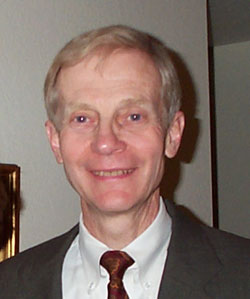2001 Distinguished Lecture Series: John E. Tilton
On Borrowed Time? Assessing the Threat of Mineral Depletion
Biography
 John E. Tilton is the William J. Coulter Professor of Mineral Economics. He is a former Director of the Division of Economics and Business, and a past president of the Mineral Economics and Management Society. His teaching and research interests over the past 30 years have focused on economic and policy issues associated with the metal industries and markets. Recent research examines the environment and mining, material substitution, the recycling of metals, the sources of productivity growth in mining, and most recently mineral resource depletion.
John E. Tilton is the William J. Coulter Professor of Mineral Economics. He is a former Director of the Division of Economics and Business, and a past president of the Mineral Economics and Management Society. His teaching and research interests over the past 30 years have focused on economic and policy issues associated with the metal industries and markets. Recent research examines the environment and mining, material substitution, the recycling of metals, the sources of productivity growth in mining, and most recently mineral resource depletion.
Professor Tilton worked for a year as an Economic Affairs Officer for the Mineral and Metals Branch of the United Nations Conference on Trade and Development in Switzerland, and spent two years at the International Institute for Applied Systems Analysis in Austria directing a research program on mineral trade and markets. More recently, he has been a Visiting Fellow at Resources for the Future in Washington, DC; a Senior Fulbright Scholar at the Ecole Nationale Superieure des Mines in Paris; and a Visiting Scholar at the Centro de Mineria at the Pontificia Universidad Catolica de Chile in Santiago. He has also served on various boards and committees of the National Research Council, including most recently the Panel on Integrated Environmental and Economic Accounting and the Committee on Technologies for the Mining Industries.
In recognition for his contributions in the field of mineral economics, he has received the Mineral Economics Award from the Society for Mining Metallurgy and Exploration, the Distinguished Service Award from the Mineral Economics and Management Society, the N.M. Rothschild Visiting Professorship in Mineral Economics from Curtin University in Australia, and an Honorary Doctorate from the Lulea University of Technology in Sweden.
Abstract
Over the past several decades a lively debate among scholars regarding the long-run availability of mineral resources has generated many new and interesting insights. Still, the debate continues. Some remain convinced it is just a matter of time before our nonrenewable resources are gone. Others believe they are for all practical purposes inexhaustible.
Drawing on the recent literature, this lecture explores the evolution of public concerns in this area, the measures used to assess resource availability, the historical trends they identify, and the implications for the future. It also addresses the environmental and other social costs associated with mineral extraction and use, and the difficulties of forcing producers and consumers to pay for those costs. Finally, it considers the implications for the future—for sustainable development, for conservation and recycling, and for population growth.
The objective is not to determine whether or not mineral depletion is a threat to modern civilization in the long run, but rather to provide a way of looking at the issues that allows members of the audience to come to their own conclusion. This, it will be argued, requires making assumptions that reasonable people can question. Which, of course, is why the debate continues.